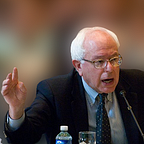Rationing Remission
Sen. Sanders put out a call for stories from people who have struggled to afford their medication under current policies. Hundreds of people responded. These people’s lives have been turned upside down — not by disease, but by the high prices for the prescription medicines they need, prices that have made their medicines unaffordable, and forced them into life-changing choices. Read the rest here and share your own story here.
Nine years ago, Anthony David Jacques — then 26 — was diagnosed with chronic myeloid leukemia, a cancer of the blood that usually strikes older persons. He had been fatigued, and was certain he was just out of shape and needed to hit the gym.
The leukemia diagnosis was a shock to Anthony and his wife; married just one and a half years, they were planning to start a family soon. But before that, Anthony, would need to start treatment with a powerful oncology medicine called Gleevec.
Though the disease had caused his white cell count to skyrocket dangerously high, “I was in remission in just eight months,” said Anthony. “That’s a testament to how awesome that drug is.”
When he and his wife finally did start their family, Anthony temporarily discontinued Gleevec. With the birth of his daughter, he re-started the treatment again. He’s been on it ever since. But not without twists and turns.
“I’ve completely changed the direction of my life several times,” Anthony said.
Gleevec, the brand name, cost about $3,400 when Anthony began taking it; with insurance, he could afford the co-pay. The medicine was one of the new “targeted” cancer compounds developed in the 1990s, with the help of scientists at the National Institutes of Health and government funding.
Now its sticker price is about $10,000 a month. In Canada, Gleevec is about one-third the cost, but insurance companies will not cover medicines imported illegally from Canada. Without insurance support, Anthony can’t afford the Canadian prices.
For a few years, he paid only $200 a month for an alleged generic version of Gleevec available by mail from India. He and his wife were living in St. Lucia, and he was teaching gemology.
“Some friends of mine were told by their insurers to pay 20% of Gleevec’s cost as their copay. But they just couldn’t afford it. A couple of them died.”
They returned to the United States and settled in St. Paul, Minnesota, around the time that the Affordable Care Act was passed. The ACA helped him pay for Gleevec.
Anthony, now 35, has new insurance connected with a new job; but getting Gleevec through the policy is taking longer than he expected.
He has run out of the medicine and can’t afford to purchase it while he waits for his insurance to kick in.
“I can’t front $10,000,” he said. “I’d been rationing it the last few months.
“It’s ironic, I work in public health,” said Anthony. “People shouldn’t have to make decisions whether to pay for medicine or some other necessity.
“Some friends of mine were told by their insurers to pay 20% of Gleevec’s cost as their copay. But they just couldn’t afford it. A couple of them died.”
